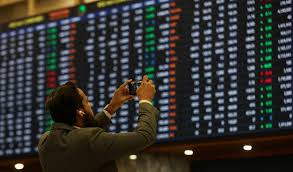
Surge in Market Confidence
Pakistan’s stock market has recently achieved a remarkable milestone, reaching record high levels amid a surge in foreign investment and increased investor confidence. The Karachi Stock Exchange (KSE), the country’s primary stock exchange, has seen a steady rise in market indices, with major companies across various sectors experiencing strong performance. This growth has been attributed to multiple factors, including positive economic reforms, improved corporate earnings, and the government’s efforts to stabilize the economy. The record high in Pakistan’s stock market reflects a renewed optimism among investors, both domestic and international, that the country’s economic recovery is on the horizon.
Growth in Foreign Investment
One of the most significant drivers of this stock market rally has been the influx of foreign investment. Pakistan has seen a substantial increase in foreign direct investment (FDI), particularly in sectors such as information technology, energy, and manufacturing. Foreign investors, attracted by Pakistan’s relatively low market valuations and the potential for high returns, have been placing substantial bets on the country’s future growth. The government’s focus on economic reforms, including tax incentives for foreign investors, has helped create a more favorable investment climate. As a result, Pakistan has experienced an uptick in foreign portfolio investments, which has positively impacted stock market performance.
Economic Reforms and Policy Support
The Pakistani government’s economic reforms have played a crucial role in attracting both foreign and domestic investment. Measures such as the reduction of interest rates, tax incentives for businesses, and efforts to streamline regulations have contributed to a more business-friendly environment. Additionally, the government’s commitment to addressing structural issues within the economy, such as fiscal deficits and energy shortages, has fostered greater market confidence. The policy support provided by Pakistan’s central bank has also been instrumental in stabilizing the financial markets, enabling smoother capital flow and encouraging more active participation in the stock market.
Optimism in Key Sectors
Certain sectors in Pakistan’s economy have particularly benefited from the growing foreign investment and the bullish sentiment in the stock market. The textile and manufacturing sectors have seen strong earnings, driven by an uptick in demand both domestically and abroad. Similarly, the information technology (IT) sector has garnered significant attention, with Pakistan emerging as a hub for outsourcing and software development services. The energy sector, too, has attracted interest due to recent initiatives aimed at improving energy infrastructure and meeting growing domestic demand. This sectoral growth, coupled with rising commodity prices globally, has propelled key stocks to new heights, further fueling the market’s overall performance.
Challenges and Future Outlook
Despite the record highs, challenges remain for Pakistan’s stock market and economy. Inflation, political instability, and security concerns continue to pose risks to sustained growth. The global economic environment, including fluctuations in commodity prices and external interest rates, could also impact Pakistan’s capital markets. Additionally, the volatility of the stock market may lead to short-term fluctuations, as seen in other emerging markets. Nevertheless, if the current trend of economic reform and foreign investment continues, Pakistan’s stock market could remain on a positive trajectory. Investors will be closely watching the country’s fiscal policies and economic indicators in the coming months to gauge whether the market’s growth can be sustained and whether Pakistan can fully capitalize on the momentum generated by this record high.
Find out how to turn your PUBG skills into earnings with our tutorial

